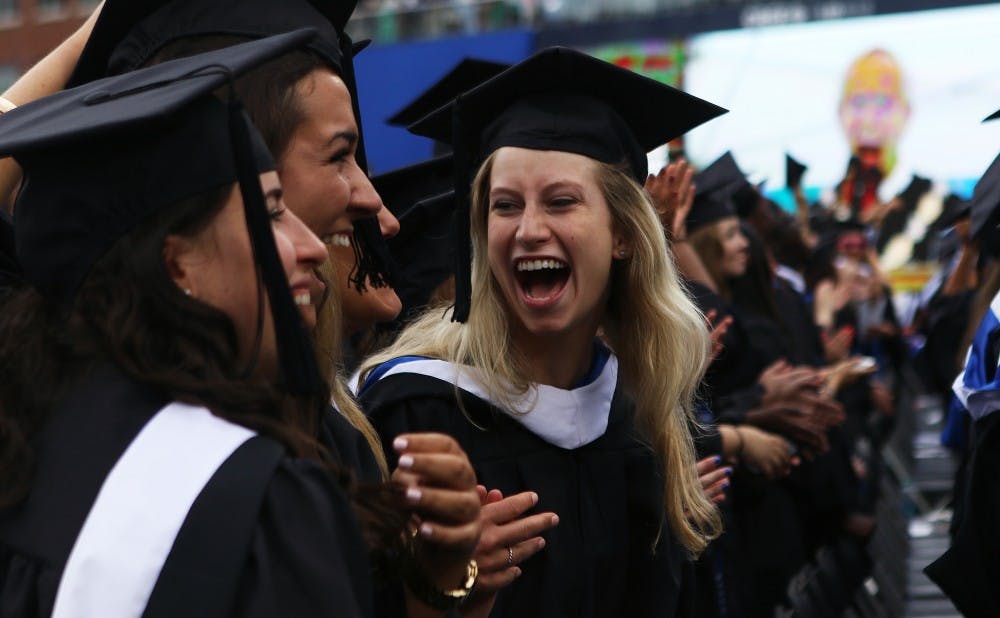Graduates of the Class of 2015 were encouraged to relate to those from different backgrounds to develop solutions to the world's most pressing problems at Sunday's commencement ceremony.
Approximately 5,100 graduates from 10 of Duke's constituent schools gathered at the Durham Bulls Athletic Park to hear commencement speaker Paul Farmer, Trinity '82 and co-founder of the international nonprofit Partners in Health. Drawing on his experience trying to bring health care to the poorest parts of the world and 13 countries, Farmer explained that his ignorance about sports is like the lack of understanding many have about people different from themselves.

“It’s important to reject the notion that we can’t really understand the views of others or their suffering or dismay,” he said. “What problems are not soluble by coming together? None.”
Although President Richard Brodhead lauded Farmer's achievements—which include being named the United Nations Secretary-General’s Special Adviser for Community-Based Medicine in 2012—he noted that he could not present Farmer with an honorary degree as is customary because of Farmer's spot on the Board of Trustees.
Farmer—who is currently a professor at Harvard University, where he received his medical degree and Ph.D.—was appointed to the Board of Trustees in 2009.
"I was the worst trustee in Duke’s history in more than a century," Farmer joked.
Farmer attended Duke as a B.N. Duke scholar before graduating summa cum laude with a bachelor’s degree in medical anthropology, co-founding Partners in Health in 1987 and beginning his work in Haiti, an experience he called "the greatest thing that ever happened to me."
Having dedicated much of his adult life to helping those from underprivileged backgrounds—most recently during the 2014 Ebola outbreak in West Africa—Farmer urged students not to leave Duke with pre-conceived ideas about what success looks like.
"Don’t hang on to narrow notions of success or to the anxiety that often accompanies them—don’t forget how lucky you are," Farmer said. "So many in this world are shut out of dreaming by forces beyond their control or their parents’ control."
Farmer's commencement address lasted approximately 40 minutes and was the focal point of the commencement ceremony, which started at 9 a.m. with a procession and lasted a little more than two hours.
Although rain fell for much of the ceremony, there were no delays and no major hiccups even though the University hosted commencement at a venue other than Wallace Wade Stadium for the first time in more than 30 years.
“You have earned your degree by your hard work and determination," Brodhead, who presided over the ceremony, said. “I just ask with you to remember with gratitude those who lifted you to this moment.”
Another major theme of this year's commencement was "Blue Devil double vision," a perspective of Duke students that permits them to be both realistic and idealistic—the concept was the topic of the student speech given by Trinity graduate Andrew Kragie.
“We can simultaneously see the world both as it is and how it might be,” he said. “We are realistic agents of change. I hope we hold on to this Blue Devil double vision.”
Kragie spoke about head coach Mike Krzyzewski's vision for the 2015 basketball team and a Duke scientist who used the polio virus to fight brain cancer as examples of "Duke innovation," which combines a "creative vision" with "painstaking execution."
Joking that "98.7 percent of my peers are going into consulting," he attributed the high percentage to the fact that Duke fosters realistic problem-solving skills among its students. He cited recent prominent social justice campaigns on campus as evidence that despite developing practical skills, students at the University still have a sense of idealism that drives them to change the world they live in.
After Kragie's speech concluded, Brodhead called David Rubenstein, Trinity '70 and chair of the Board of Trustees, to the podium to approve the graduating class.
"Nothing is more important than educating our youth and in educating our youth, nothing is more important than getting a Duke degree," Rubenstein said.
Honorary degrees were awarded to France Cordova, the director of the National Science Foundation; critically-acclaimed opera-singer Rene Fleming; Rakesh Jain, the Andrew W. Cook Professor of Tumor Biology at Harvard Medical School; Harold Mooney, the Paul S. Achilles Professor of Environmental Biology, Emeritus at Stanford; McCoy Tyner, a prolific and celebrated jazz musician; and Michael Feinberg and David Levin, co-founders of a chain of charter schools called the Knowledge is Power Program aimed at preparing underprivileged youth to go to college.

After the commencement ceremony adjourned, many departments held receptions and ceremonies to honor graduates. Among them was the Political Science department, which presented NBA commissioner Adam Silver, Trinity '84, with its Distinguished Alumni award.
During his remarks, Silver stressed that sports can build bridges, referring to the international and political importance of his work and asking graduates to use their degrees in a similar fashion.
Another notable sports figure—former Blue Devil, NBA player and current NBA analyst Shane Battier—addressed graduates of the Fuqua School of Business at multiple ceremonies at Cameron Indoor Stadium Saturday.
Commencement is expected to return to Wallace Wade Stadium next year after construction is completed. Duke's football stadium has hosted commencement since 1984, and keeping the weekend's main event on campus will allow many departmental ceremonies to stay on campus as well.
Get The Chronicle straight to your inbox
Signup for our weekly newsletter. Cancel at any time.
Adam Beyer is a senior public policy major and is The Chronicle's Digital Strategy Team director.

